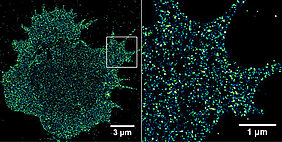Millions to promote medical research
12/07/2016The European Structural Funds supports two new projects of the University of Würzburg with more than EUR 4.3 million. In close cooperation with the University Hospital and regional companies, research activities aim to drive medical progress.

"The Bavarian State Ministry for Education, Science and the Arts funds two seminal projects which the University of Würzburg runs jointly with regional companies by providing more than EUR 4.3 million in total from funds of the European Regional Development Fund", Bavarian Minister of State, Dr Ludwig Spaenle, announced a few days ago.
"The university collaborates closely with local companies in application-oriented research projects for cancer therapy and diagnosis and treatment of heart attacks and strokes. Hence, science and industry are working together to drive medical progress and develop the best possible treatment options for patients," says Spaenle.
New ways of immunotherapy for cancer patients
One of these projects is the "Center for Personalized Molecular Immunotherapy" which the Department of Biotechnology and Biophysics of the University of Würzburg will establish together with the Würzburg University Hospital. The project is led by Professor Markus Sauer, who holds the chair, and Professor Hermann Einsele, the Director of the Department of Medicine and Policlinic II. The project is funded with more than EUR 2.5 million.
Teaming up with regional companies, the participating scientists want to explore new ways of providing immunotherapy for cancer patients and have the corresponding methods developed by companies specialised in biotechnology and biomedicine.
Background: Each year around 14 million people worldwide are diagnosed with cancer; more than half die as a result of the disease. Experts assume that in a few years cancer will be the number one cause of death not only in Europe but in the world. At the same time, therapy options to fight tumours are increasing rapidly and new immunotherapies are enabling efficient "personalised" tumour treatment for the first time.
Identifying eligible patients for immunotherapy
Diagnostics is crucial in this context: "The new drugs are highly potent and as a result new immunotherapies may also attack healthy cells under certain circumstances," explains Markus Sauer. He emphasises the importance of identifying patients that can actually benefit from the new drugs prior to starting treatment.
The technique to be used is called "single-molecule sensitive fluorescence microscopy". Sauer is convinced that this method is indispensable from a "medical, health economics and social perspective".
The Center for Personalized Molecular Immunotherapy now aims to further build the existing expertise at the University of Würzburg in the field of immunotherapy and highly sensitive fluorescence microscopy to be able to initiate efficient personalized immunotherapy without side effects. At the same time, the Bavarian industry is to benefit from the collaboration of companies and application-oriented research institutes.
New therapies and enhanced diagnosis of cardiovascular diseases
The second project is the "Translation Network for the Research and Diagnosis of Thrombo-inflammatory Diseases". Heart attacks, strokes and other cardiovascular diseases fall into this category. They currently account for the majority of deaths in developed countries. These diseases are responsible for around 40 percent of all deaths in Germany and they are associated with considerable individual health consequences and generate high health costs.
Due to ageing populations, the number of cardiovascular diseases is expected to increase further. This applies in particular to strokes as there are only very limited treatment options for affected patients – unlike for a heart attack. Accordingly, these patients would benefit particularly from improved diagnostics and new therapeutic strategies.
This is where the "Translation Network for the Research and Diagnosis of Thrombo-inflammatory Diseases" takes action. It is led by Professor Bernhard Nieswandt from the Rudolf Virchow Center of Experimental Biomedicine at the University of Würzburg. The network is funded with around EUR 1.8 million.
Bridge between science and industry
The network conducts application-oriented cardiovascular research and acts as a platform of innovations between fundamental research and development. Its goal is to network science and industry more efficiently and to combine forces with small- and medium-sized companies especially from structurally weak regions in North Bavaria to develop diagnostic procedures for thrombo-inflammatory diseases and help establish innovative therapy approaches and preclinical trials. This includes, for example, new methods of diagnosis and early detection markers to identify the risk of haemorrhage in patients more easily. Another objective is to develop drugs that are suitable to treat patients.
"The network thus builds a bridge between industry and science and contributes to further developing innovative diagnostic and therapeutic procedures towards marketable products," Bernd Nieswandt explains. He believes that this will strengthen Bavaria as a "European top region for innovative companies".
The European Regional Development Fund
The Ministry for Education, Science and the Arts will receive EUR 48 million worth of funding from the European Regional Development Fund (ERDF) between 2014 and 2020. It uses the money to promote projects which universities implement jointly with small and medium-sized companies in the region. The goal is to improve the transfer of technology between science and industry and to boost innovations made by companies in the region.
Contact
Prof. Dr. Markus Sauer Markus, T: +49 931 31-88687, m.sauer@uni-wuerzburg.de
Prof. Dr. Bernhard Nieswandt, T: +49 931 18-80406, nieswandt_b@ukw.de
To the homepage of the Rudolf Virchow Center
To the homepage of the Department for Biotechnology and Biophysics






